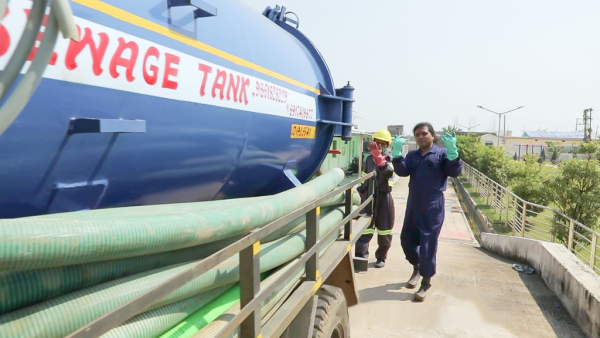Odisha ‘torch bearer’ in successful non-sewered sanitation
10 Nov 2023 by The Water Diplomat

Odisha State in India has become a ‘torch bearer’ in successful expansion of non-sewered sanitation. In 2014, the State did not have a single Sewage Treatment Plant (STP) installed and only 2% of municipal sewage was being treated. The Odisha State Pollution Control Board presented the contamination status of the rivers in the State in 2015, and most cities reported up to ten incidents whereby the legal limits of coliform organisms and other indicators of biologically contaminated water were reported. In 2015 it commissioned its first STP with a capacity of 15,000 m³ / day. However, by 2018, the state featured a total of 108 STP’s which were operational, under construction, under tender evaluation or tender process – of which ten were already operational. This expansion was made possible with support from the Bill and Melinda Gates Foundation.
Triggered by a National workshop on fecal sludge management, the leap forward was initiated by the Odisha Water Supply and Sewerage Board, and it has now become a model for other States to replicate. The model is referred to as the Odisha Fecal Sludge and Septage Management (FSSM) system. The FSSM system is a decentralized system includes a revamp of existing fecal sludge and septage management, the construction of new infrastructure, the development of new regulations, capacity building and community engagement across the State. Through community engagement and capacity building – involving rigorous training to local groups on managerial, financial & technical aspects - the operation and maintenance of the installations is handed over to community groups – with a focus on women and transgender groups, providing local employment opportunities. The result of this approach is that the community has a sense of ownership and responsibility with regard to the infrastructure and becomes the de facto management of the system – under the guidance of the State Board. The employees have gained independence through their stable income and have been empowered through the capacity building process to become managers and technician operating the sites.
The rapid expansion of safely managed sanitation systems has earned the Indian State of Odisha acclaim for its achievements, with awards including for the best FSSM model and the best engagement model in sanitation.
Increased urbanization across the world is leading to an increasing geographical concentration of water demand. At the same time this water is under threat by a rise in wastewater production. Reuse of treated sewage can reduce the water demand as well as reducing the pollution load entering water systems. from sewage. India generates about 73 million m³ of sewage per day, whereas the installed capacity of sewage treatment plants nationally is around 32 million m³ per day, or 44% of the total. Examples like those of Odisha State shows the way forward for accelerated achievement of the targets under Sustainable Development Goal 6 on water and sanitation.
